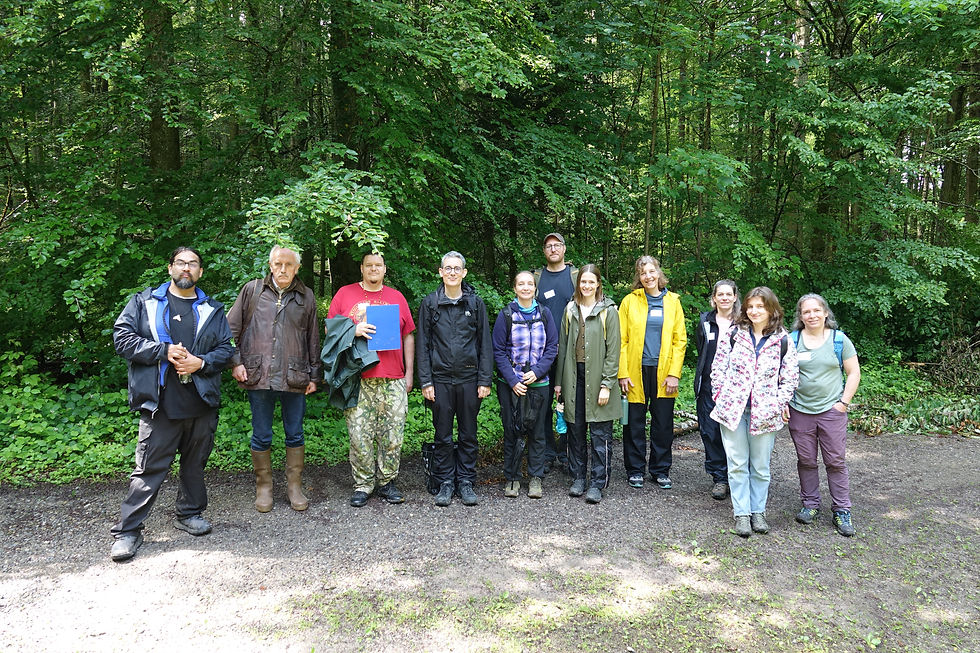Re-visibilizing relations: Centering Indigenous Knowledge in Switzerland's path to transformation
- rosececilenelson
- Apr 15, 2025
- 3 min read
Updated: Sep 11, 2025

How can we rethink relations among humans and the rest of nature in a way that doesn’t repeat colonial patterns? The FIRI project brought together Indigenous stewardship specialists, Swiss conservationists, and academic researchers to co-create transformative approaches grounded in holistic worldviews—challenging Western assumptions and reimagining change.
Global experts agree that the global crises of biodiversity loss, climate change, and social inequities call for transformative change. Transformative change here refers to the transformation and reorganization of a broad range of systems and structures, spanning from technology and economy to social and values systems. To achieve such a transformation, relevant initiatives benefit from building on transdisciplinary collaborations that include the perspectives of diverse actors, scholars, and practitioners across academic and non-academic fields. By being informed by multiple experts and opinions, outputs are likely more equitable and can mitigate the risk of privileging one specific group. Some approaches to transformative change do this by including Indigenous perspectives, which center on holistic understandings of certain relations that tend to be imagined as oppositional in Western worldviews, such as human/nature. This is especially apt, as many approaches towards transformation include attempts to redefine relations between humans and the rest of nature. However, by building on a Western viewpoint of humans as separate from the rest of nature, this perspective risks reinforcing the colonially-informed way of thinking that helped usher in the current state of human-nature relations. While the inclusion of Indigenous knowledge is meant to shed light on alternative ways of understanding and valuing these relations, it brings with it multiple risks. Risks include reproducing colonial power hierarchies where Indigenous knowledge is extracted or included superficially yet not considered to be equally as important or valid as other knowledge systems.
The FIRI project reimagines this approach towards transformation by centering Indigenous knowledge and inviting the intervention of Indigenous peoples in Swiss practices. In alignment with holistic worldviews, it understands the contemporary problem of human-nature relations as resulting from a process of “in-visibilization” rather than disconnection. It thereby aims to reverse the colonial flow of knowledge and power and allow for a different way of thinking about human-nature relations in a Western context with a disputed colonial past, Switzerland.
The FIRI project consists of a team of Indigenous stewardship specialists, Swiss nature conservation practitioners, and academic researchers based out of the University of Zurich. The project has been organized around a co-produced approach towards transformative change, which is made possible by the complementary knowledge and experiences of all of the group members. Its organization was planned in such a way that Indigenous knowledge is centered throughout the project.
The project was structured around two workshops held in May and October of 2024, with additional virtual and in-person meetings preceding and following both workshop dates. Overall, the project was designed around three phases following Lang et al. (2012):
Phase A: Problem framing and team building
This first phase included introductions of the different team members and their perspectives, as well as cross-cultural and decolonial training. Later on, during the first workshop, problem identification and an initial brainstorming of Protocols, Practices, and Methods (PPMs) for “re-visibilizing” human-nature relations were also included in this problem-framing phase.
In preparation for the first workshop, which took place in May 2024, a series of Zoom meetings were held with all project participants, as well as two in-person decolonial discussions with the team members based in Zurich (and Bern). The organization of Zoom meetings called for compromises by all parties involved, seeing as we spanned multiple time zones. We tried to find a meeting time that could accommodate the schedules of the Indigenous fellows based out of the West Coast of the United States and the rest of the team in Switzerland. These meetings gave project participants the chance to become acquainted and kickstart the team-building process. The first workshop additionally incorporated a series of methods aimed at creating a shared team identity.
Phase B: Co-creation of solution-oriented transferable knowledge
During the second phase, which was kickstarted during the first workshop and revisited during the second, solution-oriented methods were the focus. A series of meetings outside of the workshop days additionally contributed to the output of co-created knowledge. The main output was a list of co-developed PPMs, which were initially co-produced during the first workshop and later adapted and amended during the second workshop and in the follow-up meetings. Based on the expertise of the Swiss nature conservation practitioners and their perceived need for alternative approaches, the team chose two case studies: Human-wolf interactions and “wilderness” education in Switzerland. These case studies offered a concrete context from which to develop our (generalized) PPMs, and then later to experiment with as a “prototype” for applying and operationalizing the PPMs.
Phase C: Analysis and (re)integration and application of created knowledge
Analysis and adaptation of findings and team members’ perceptions were central throughout the project. For example, the findings of the first workshop, as analyzed according to data from questionnaires, daily reflections, exit interviews, and notes taken throughout the project, were discussed and reincorporated into the planning of the second workshop. Additionally, the PPMs were shared on the final workshop day during a community outreach event in Zurich and at the International Transdisciplinarity (ITD) conference in Utrecht, Netherlands, in November 2024. On both occasions, further participants were introduced to the project and PPMs and encouraged to experiment with their application in their areas of expertise.



Comments